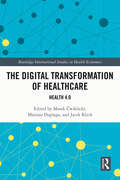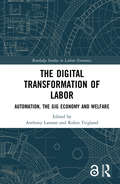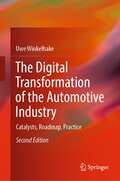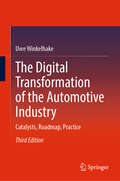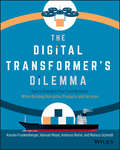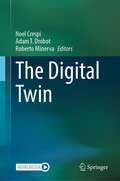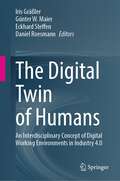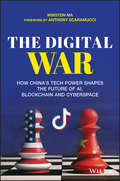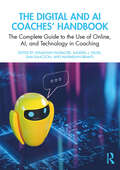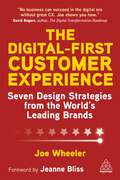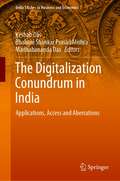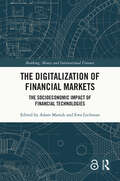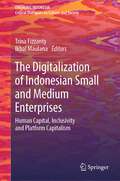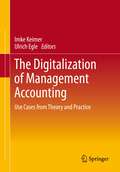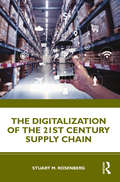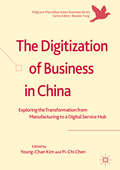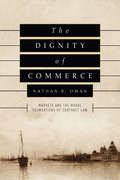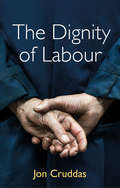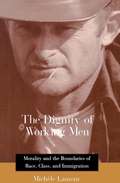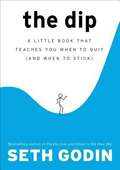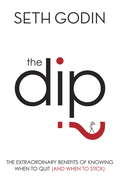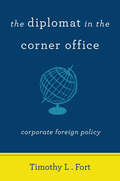- Table View
- List View
The Digital Transformation of Healthcare: Health 4.0 (Routledge International Studies in Health Economics)
by Mariusz Duplaga Jacek Klich Marek ĆwiklickiHealth 4.0 is a term that has derived from the Fourth Industrial Revolution (Industry 4.0), as it pertains to the healthcare industry. This book offers a novel, concise, but at the same time, broad picture of the challenges that the technological revolution has created for the healthcare system. It offers a comprehensive view of health sector actors’ interaction with the emerging new technology, which is disrupting the status quo in health service delivery. It explains how these technological developments impact both society and healthcare governance. Further, the book addresses issues related to key healthcare system stakeholders: the state, patients, medical professionals, and non-governmental organizations. It also examines areas of healthcare system adaptiveness and draws its conclusions by analysing recent health policy changes in different countries across the Americas, Europe, and Asia. The authors offer an innovative approach to the subject by identifying the critical determinants of successful implementation of the Fourth Industrial Revolution’s outcomes in practice, on both a macro- and microlevel. The macrolevel analysis is focused on essential factors of healthcare system adaptiveness for Health 4.0, while the microlevel relates to patients’ expectations with a particular emphasis on senior citizens. The book will appeal to academics, researchers, and students, across a wide range of disciplines, such as health economics, health sciences, public policy, public administration, political science, public governance, and sociology. It will also find an audience among healthcare professionals and health and social policymakers due to its recommendations for implementing Industry 4.0 into a healthcare system.
The Digital Transformation of Labor: Automation, the Gig Economy and Welfare (Routledge Studies in Labour Economics)
by Robin Teigland Anthony LarssonThrough a series of studies, the overarching aim of this book is to investigate if and how the digitalization/digital transformation process causes (or may cause) the autonomy of various labor functions, and its impact in creating (or stymieing) various job opportunities on the labor market. This book also seeks to illuminate what actors/groups are mostly benefited by the digitalization/digital transformation and which actors/groups that are put at risk by it. This book takes its point of departure from a 2016 OECD report that contends that the impact digitalization has on the future of labor is ambiguous, as on the one hand it is suggested that technological change is labor-saving, but on the other hand, it is suggested that digital technologies have not created new jobs on a scale that it replaces old jobs. Another 2018 OECD report indicated that digitalization and automation as such does not pose a real risk of destroying any significant number of jobs for the foreseeable future, although tasks would by and large change significantly. This would affects welfare, as most of its revenue stems from taxation, and particularly so from the taxation on labor (directly or indirectly). For this reason, this book will set out to explore how the future technological and societal advancements impact labor conditions. The book seeks to provide an innovative, enriching and controversial take on how various aspects of the labor market can be (and are) affected the ongoing digitalization trend in a way that is not covered by extant literature. As such, this book intends to cater to a wider readership, from a general audience and students, to specialized professionals and academics wanting to gain a deeper understanding of the possible future developments of the labor market in light of an accelerating digitalization/digital transformation of society at large.
The Digital Transformation of the Automotive Industry: Catalysts, Roadmap, Practice
by Uwe WinkelhakeBuilding on his decades of experience as a consultant and project manager in the automotive industry, the author develops comprehensive and pragmatic recommendations for action regarding the digital transformation of the automotive and supplier industries. At the heart is the transition from a vehicle-focused to a mobility-oriented business model. Based on the catalysts of the digital change, four digitizsation fields are structured, and a roadmap for their transformation is presented. The topics of comprehensive change in corporate culture and an agile and efficient information technology are covered in detail as vital success factors. Selected practical examples of innovative digitizsation projects provide additional ideas and impulses. An outlook on the automotive industry in the year 2040 completes the discourse.
The Digital Transformation of the Automotive Industry: Catalysts, Roadmap, Practice
by Uwe WinkelhakeThis book provides comprehensive and pragmatic recommendations for action for the automotive and supplier industry, which has been changing ever more rapidly in recent years. China has developed into the leading market for e-mobility and for the use of autonomous robotaxis, AI and data. The established manufacturers have to change much more quickly based on clear objectives in order not to lose touch and to still be able to achieve the Paris climate goals. The industry is changing comprehensively from a vehicle-focused to a mobility-oriented business model. More and more processes, even entire business areas, will run automatically based on AI and new technologies will change sales and aftersales structures. More and more data is being created, which also enables new, profitable products. The switch to e-vehicles with an appropriate charging environment, the use of mobility services instead of car ownership, climate-neutral production and the circular economy must be addressed more quickly. The third edition of the book provides complete information on the digital transformations that are still absolutely necessary and taking into account the latest developments revised edition comprehensive and pragmatic answers to current questions: How should new technologies be used in a structured manner and where will AI lead to significant changes? How should the transformation be approached and with what key topics? The outlook beyond 2040 at the end of the book has been expanded and the expected changes in the world of work are considered, especially from an AI perspective. Regarding the digital transformations that are still absolutely necessary and taking into account the latest developments, the book, now in its third completely revised edition, provides comprehensive and pragmatic answers to current questions: How should new technologies be used in a structured manner and where will AI lead to significant changes? How should the transformation be approached and with what key topics? The outlook beyond 2040 at the end of the book has been expanded and the expected changes in the world of work are considered, especially from an AI perspective.
The Digital Transformer's Dilemma: How to Energize Your Core Business While Building Disruptive Products and Services
by Markus Schmidt Karolin Frankenberger Hannah Mayer Andreas ReiterBring your company into the digital era without compromising your core business In The Digital Transformer's Dilemma: How to Energize Your Core Business While Building Disruptive Products and Services, the authors show companies how to go digital while also advancing their core business. The book emphasizes how to strike a difficult balance between establishing a new (digital) business and re-vitalizing – and digitizing – the legacy business. The core of the book is focused on the actual implementation of the digital transformation across both businesses, providing concrete tips, tricks, tools and action plans across six key dimensions: Crafting a flexible organization Using technology as a driver Designing the necessary processes Building transformational leaders “Right-skilling” the workforce of the future Galvanizing cultural change The Digital Transformer’s Dilemma is a very visual book, filled with dozens of engaging illustrations that bring the contained concepts to life on the page. Based on 100+ interviews with senior executives at leading companies (such as Nestlé, Novartis, Volkswagen, BNP Paribas, BASF and Michelin) and smaller hidden champions, numerous illuminating case studies, and the authors’ own experience from working in international management consulting and years of academic experience, the book highlights the fundamental principles required for executives and businesspeople to transform legacy organizations into digitally empowered companies.
The Digital Twin
by Roberto Minerva Noel Crespi Adam T. DrobotThe Digital Twin is crucial and timely for positively affecting how we work, live, and play. It eliminates the gap between experimentation and learning by bridging real and virtual worlds in a powerful methodology, making significant headway in conquering previously unsolvable problems and challenges. Digital Twins are made possible by four widely deployed infrastructures for connectivity, computing, digital storage, and sources of digital data. The Digital Twin provides insights, paths to innovation, efficient production of goods, improved delivery of services, better experiences and entertainment, and new business models. Investing in Digital Twins is one of the most valuable ways to create sustainable paths to the future. The Digital Twin book is the most comprehensive work on the subject to date. It brings together top practitioners, technical experts, analysts, and academics to explore and discuss the concept of the Digital Twin, its history, evolution, and the profound impact across sectors of the global economy. The book addresses the business value, technological underpinnings, lessons learned from implementations, resources for success, practical approaches for implementation, and illustrative use cases. It makes the case for why we believe that Digital Twins will fundamentally transform major industries and enable us to fulfill important societal goals. The book is recommended for key decision makers, senior executives, technical leaders, researchers, and students.
The Digital Twin of Humans: An Interdisciplinary Concept of Digital Working Environments in Industry 4.0
by Günter W. Maier Eckhard Steffen Iris Gräßler Daniel RoesmannThis book provides an interdisciplinary concept of digital working environments in industry 4.0 to enable the implementation of the digital twin of humans.Information and communication technology is penetrating all areas of daily life at a rapid pace in private and professional areas. These technologies enable companies to aggregate huge volumes of data. Collected personal data of employees creates the opportunity of a digital representation of the human being itself, that is conformant with the definition of a digital twin. These digital twins of humans include selected characteristics and behaviour of the humans, that are linked to models, information, and data. According to existing trend studies, the digital twin of humans is a technology that will have a significant impact on the economy, society, and people. It is important to consider the regulatory framework for the use of personal data and threats of misuse.This book will be of use to researchers and professionals in industry.
The Digital War: How China's Tech Power Shapes the Future of AI, Blockchain and Cyberspace
by Winston MaWhat new directions in China’s digital economy mean for us all China is the largest homogenous digital market on Earth: unified by language, culture, and mobile payments. Not only a consumer market of unrivaled size, it’s also a vast and hyperactive innovation ecosystem for new technologies. And as China’s digital economy moves from a consumer-focused phase to an enterprise-oriented one, Chinese companies are rushing to capitalize on ways the newer wave of tech—the Internet of Things, AI, blockchain, cloud computing, and data analytics (iABCD)—can unlock value for their businesses from non-traditional angles. In China’s Data Economy, Winston Ma—investment professional, capital markets attorney, adjunct professor of digital economy, and bestselling author—details the profound global implications of this new direction, including how Chinese apps for services such as food delivery expand so quickly they surpass their U.S. models within a couple of years, and how the sheer scale and pace of Chinese innovation might lead to an AI arms race in which China and the U.S. vie aggressively for leadership. How China’s younger netizens participate in their evolving digital economy as consumers, creators, and entrepreneurs Why Online/Office (OMO, Online-merge-with-Offline) integration is viewed as the natural next step on from the O2O (Online-to-Offline) model used in the rest of the world The ways in which traditional Chinese industries such as retail, banking, and insurance are innovating to stay in the game What emerging markets can learn from China as they leapfrog past the personal computer age altogether, diving straight into the mobile-first economy Anyone interested in what’s nex
The Digital and AI Coaches' Handbook: The Complete Guide to the Use of Online, AI, and Technology in Coaching (The Coaches' Handbook Series)
by Jonathan Passmore Sam Isaacson Sandra J. Diller Maximilian BrantlThis comprehensive practitioner guide supports coaches in developing their understanding of digital technologies and how to work in ever-changing digital environments, and shows coaches how to craft their own practices to take advantage of working online.The practice of coaching is undergoing significant change, with technology widely embedded and used in professional coaching services today. Coaching practitioners worldwide are adapting to digital environments, and a host of new technological tools have come into play, from the developments in virtual reality to AI-informed coaching, and from coaching bots to workplace apps. Edited by Jonathan Passmore, Sandra J. Diller, Sam Isaacson, and Maximilian Brantl, this third book in the acclaimed Coaches’ Handbook Series brings together internationally respected coaching experts and practitioners to share the most up-to-date know-how. The book takes you through key technical developments, the critical factors in making digital coaching successful, and how to build a coaching business using these technologies. The book also considers the impacts on the wider industry and concludes with a number of case studies of global coaching organisations and their experiences of using digital techniques, including CoachHub and EZRA.Aimed at coach practitioners, their supervisors, trainers, and student coaches on accreditation programmes or undertaking training for a certificate in coaching, this book showcases best practice, new ideas, and the science behind the digital revolution within coaching practice and the coaching industry.
The Digital-First Customer Experience: Seven Design Strategies from the World’s Leading Brands
by Joe WheelerThe definitive guide to designing digital-first experiences customers love. In his third book on the topic of customer experience, bestselling author and consultant Joe Wheeler tackles the challenges many organizations are facing as they attempt to design compelling experiences in a digital-first world. It features case studies of leading brands including Lemonade, Spotify, CEMEX, VMware, Starbucks, NIKE and Amazon.Part One introduces the new "3 Cs", key trends associated with technology convergence, competition and culture change in a post-pandemic world. Part Two takes a deep dive into seven design strategies, from designing emotional peaks across channels to empowering customers through immersive experiences that merge physical and digital assets. Part Three provides a playbook for how to design digital-first experiences, including how to solve the right problems, develop a measurable business case, design digital-first experiences customers love and execute the new design at scale.
The Digitalisation of Anti-Corruption in Brazil: Scandals, Reforms, and Innovation (ISSN)
by Fernanda OdillaThis book investigates how digital technologies, such as social media and artificial intelligence, can contribute to combatting corruption in Brazil.Brazil, with its long history of scandals and abundant empirical data on digital media usage, serves as a perfect case study to trace the development of bottom-up and top-down digital anti-corruption technologies and their main features. This book highlights the connections between anti-corruption reforms and the rapid implementation of innovative solutions, primarily developed by tech-savvy public officials and citizens committed to anti-corruption efforts. The book draws on interviews with experts, activists and civil servants, as well as open-source materials and social media data to identify key actors, their practices, challenges and limitations of anti-corruption technologies. The result is a thorough analysis of the process of digitalisation of anti-corruption in Brazil, with a theoretical framework which can also be applied to other countries. The book introduces the concept of “integrity techies” to encompass social and political actors who develop and facilitate anti-corruption technologies, and discusses different outcomes and issues associated with digital innovation in anti-corruption.This book will be a key resource for students, researchers and practitioners interested in technologies and development in Brazil and Latin America, as well as corruption and anti-corruption studies more broadly.
The Digitalization Conundrum in India: Applications, Access and Aberrations (India Studies in Business and Economics)
by Keshab Das Bhabani Shankar Prasad Mishra Madhabananda DasThis book examines the nature, extent and implications of rapid strides digitalization has made in India since the turn of the millennium. These have been examined not merely in the sphere of information and communication technology (ICT) but its multifarious applications spreading across almost all aspects of production, services and institutions which have profound repercussions for the transformation of the society and economy at the micro, meso and macro levels. With contributions from both ICT scholars and social scientists, this book presents diverse scenarios and unravels challenges faced in the process of technical applications, access by the users of these disruptive technologies (automation, e-commerce, big data analytics & algorithms, artificial intelligence, cloud computing, etc.) which, unlike heavy machines (embodied technology), mostly defy physical space, pace of mobility and inoperability between technologies. Chapters in this volume address challenges and possibilities in establishing and operating intricate engineering infrastructure, technical and societal constraints encountered in broad-basing digitalization across layers of educational and social skills conducive to difficult geographies. Issues dealt within this book include farming, healthcare, education, food processing, e-commerce, labour, rural community development, open source data and information democracy. The chapters also reflect upon implications on local economy and society, of the very global nature of these seamless technologies where inter-operability remains the quintessential advantage of digitalization whether promoted or spearheaded through the state, private sector or global capital. The book critiques policy inadequacies and suggests plausible policy approaches to reduce the adverse impacts of fast digitalization and broad-base potential benefits across space and levels of socio-economic development of regions and society. This book would be of interest to scholars, practitioners, technocrats, industry analysts, policy makers and civil society agencies.
The Digitalization of Financial Markets: The Socioeconomic Impact of Financial Technologies (Banking, Money and International Finance)
by Ewa Lechman Adam MarszkThe book provides deep insight into theoretical and empirical evidence on information and communication technologies (ICT) as an important factor affecting financial markets. It is focused on the impact of ICT on stock markets, bond markets, and other categories of financial markets, with the additional focus on the linked FinTech services and financial institutions. Financial markets shaped by the adoption of the new technologies are labeled ‘digital financial markets’. With a wide-ranging perspective at both the local and global levels from countries at varying degrees of economic development, this book addresses an important gap in the extant literature concerning the role of ICT in the financial markets. The consequences of these processes had until now rarely been considered in a broader economic and social context, particularly when the impact of FinTech services on financial markets is taken into account. The book’s theoretical discussions, empirical evidence and compilation of different views and perspectives make it a valuable and complex reference work. The principal audience of the book will be scholars in the fields of finance and economics. The book also targets professionals in the financial industry who are directly or indirectly linked to the new technologies on the financial markets, in particular various types of FinTech services.
The Digitalization of Indonesian Small and Medium Enterprises: Human Capital, Inclusivity and Platform Capitalism (Engaging Indonesia)
by Trina Fizzanty Ikbal MaulanaThis book examines the digitalization of Small and Medium Enterprises (SMEs) in Indonesia and its challenges in the context of an emerging economy and the Covid-19 crisis. During the Covid-19 pandemic, business digitalization became a must for a business to avoid collapse and people saw that digital transformation is a panacea for SMEs to help them survive and revive from the crises. Governments and other stakeholders in many countries including Indonesia have launched policies and programs to support SMEs. Transforming SMEs' conventional businesses into digitalized versions, however, is a complex issue influenced by various factors. These factors encompass both internal changes within the organization and external dynamics in the ecosystem in which they operate. This book, therefore, is a new approach towards understanding the digitalization of SMEs in Indonesia and includes contributions from scholars with different, multi-disciplinary perspectives and demonstrates that digital transformation of SMEs is not all about technology adoption but also involves other aspects such as social, economic, and public governance factors. It discusses opportunities and challenges of digital transformation of SMEs in Indonesia, such as digital talent, financial inclusion, platform capitalism, automation, government’s role, governance, open competition, and inclusive digital economy. The book is of interest to researchers and students of social economics, SMEs and entrepreneurship, human capital research, and economy and governance.
The Digitalization of Management Accounting: Use Cases from Theory and Practice
by Imke Keimer Ulrich EgleDigital transformation has companies firmly in its grip. Digitalization has a multidimensional impact on the mangagement accounting function and is changing mangagement accounting processes, controlling methods and the role of the mangagement accountant. This edited work shows how the opportunities of digitalization can be used in a way that adds value to the mangagement accounting function. The authors describe individual dimensions of digitalization in mangagement accounting and convey the necessary fundamentals and concepts. Use cases from controlling practice complement the theoretical foundations and show cross-industry approaches to solutions.
The Digitalization of the 21st Century Supply Chain
by Stuart M. RosenbergThe goal of this book is to gain a clear picture of the current status and future challenges with regard to the digitalization of the supply chain – from the perspective of the suppliers, the manufacturers, and the customers. They were the target groups of the book. Digitization has touched upon all aspects of businesses, including supply chains. Technologies such as RFID, GPS, and sensors have enabled organizations to transform their existing hybrid (combination of paper-based and IT-supported processes) supply chain structures into more f lexible, open, agile, and collaborative digital models. Unlike hybrid supply chain models, which have resulted in rigid organizational structures, unobtainable data, and disjointed relationships with partners, digital supply chains enable business process automation, organizational flexibility, and digital management of corporate assets. In order to reap maximum benefits from digital supply chain models, it is important that companies internalize it as an integral part of the overall business model and organizational structure. Localized disconnected projects and silo-based operations pose a serious threat to competitiveness in an increasingly digital world. The technologies discussed in this text – artificial intelligence, 3D printing, Internet of things, etc. – are beginning to come together to help digitize, automate, integrate, and improve the global supply chains. It’s certainly an exciting and challenging time for both new supply chain professionals and long-time supply chain professionals.
The Digitization of Business in China: Exploring the Transformation from Manufacturing to a Digital Service Hub (Palgrave Macmillan Asian Business Series)
by Pi-Chi Chen Young-Chan KimOne of the first of its kind, this book examines the digitalization of Chinese businesses both theoretically and practically. Taking a fresh and unique approach, the authors seek to adopt individual theories for each empirical case explored and investigate the dramatic digital transformation that Chinese firms have undergone in recent years. With a particular focus on social networks, the authors observe and analyze the way that digitized applications can interlink with financial systems, developing new capabilities that help to yield competitive advantage. Covering both small to medium sized enterprises (SMEs) and globally orientated multinational enterprises (MNEs), this book is a valuable resource for those researching Asian business, or international business more generally, as well as innovation and technology management.
The Dignity of Commerce: Markets and the Moral Foundations of Contract Law
by Nathan B. OmanWhy should the law care about enforcing contracts? We tend to think of a contract as the legal embodiment of a moral obligation to keep a promise. When two parties enter into a transaction, they are obligated as moral beings to play out the transaction in the way that both parties expect. But this overlooks a broader understanding of the moral possibilities of the market. Just as Shakespeare’s Shylock can stand on his contract with Antonio not because Antonio is bound by honor but because the enforcement of contracts is seen as important to maintaining a kind of social arrangement, today’s contracts serve a fundamental role in the functioning of society. With The Dignity of Commerce, Nathan B. Oman argues persuasively that well-functioning markets are morally desirable in and of themselves and thus a fit object of protection through contract law. Markets, Oman shows, are about more than simple economic efficiency. To do business with others, we must demonstrate understanding of and satisfy their needs. This ability to see the world from another’s point of view inculcates key virtues that support a liberal society. Markets also provide a context in which people can peacefully cooperate in the absence of political, religious, or ideological agreement. Finally, the material prosperity generated by commerce has an ameliorative effect on a host of social ills, from racial discrimination to environmental destruction. The first book to place the moral status of the market at the center of the justification for contract law, The Dignity of Commerce is sure to elicit serious discussion about this central area of legal studies.
The Dignity of Labour
by Jon CruddasDoes work give our lives purpose, meaning and status? Or is it a tedious necessity that will soon be abolished by automation, leaving humans free to enjoy a life of leisure and basic income? In this erudite and highly readable book, Jon Cruddas MP argues that it is imperative that the Left rejects the siren call of technological determinism and roots it politics firmly in the workplace. Drawing from his experience of his own Dagenham and Rainham constituency, he examines the history of Marxist and social democratic thinking about work in order to critique the fatalism of both Blairism and radical left techno-utopianism, which, he contends, have more in common than either would like to admit. He argues that, especially in the context of COVID-19, socialists must embrace an ethical socialist politics based on the dignity and agency of the labour interest. This timely book is a brilliant intervention in the highly contentious debate on the future of work, as well as an ambitious account of how the left must rediscover its animating purpose or risk irrelevance.
The Dignity of Working Men: Morality and the Boundaries of Race, Class, and Immigration
by Michele LamontThis study examines the way that working-class men both define themselves and the rest of society. The book analyzes the importance placed on moral standards and the rigid racial and class boundaries drawn by the men in their construction of their own definition of success.
The Dip
by Seth GodinEvery new project (or career or relationship) starts out exciting and fun. Then it gets harder and less fun, until it hits a low point - really hard, really not fun. At this point you might be in a Dip, which will get better if you keep pushing, or a Cul-de-Sac, which will never get better no matter how hard you try. The hard part is knowing the difference and acting on it. According to marketing guru and best-selling author Seth Godin, what sets successful entrepreneurs (and pop stars and weight lifters and car salesmen) apart from everyone else is their ability to give up on Cul-de-Sacs while staying motivated in Dips. Winners quit fast, quit often and quit without guilt - until they commit to beating the right Dip for the right reasons. You'll never be number one at anything without picking your shots very carefully. The Dip is a short, entertaining book that helps you do just that. It will forever alter the way you think about success.
The Dip
by Seth GodinThe old saying is wrong--winners do quit, and quitters do win. Every new project (or job, or hobby, or company) starts out exciting and fun. Then it gets harder and less fun, until it hits a low point--really hard, and not much fun at all. And then you find yourself asking if the goal is even worth the hassle. Maybe you're in a Dip--a temporary setback that will get better if you keep pushing. But maybe it's really a Cul-de-Sac, which will never get better, no matter how hard you try. According to bestselling author Seth Godin, what really sets superstars apart from everyone else is the ability to escape dead ends quickly, while staying focused and motivated when it really counts. Winners quit fast, quit often, and quit without guilt--until they commit to beating the right Dip for the right reasons. In fact, winners seek out the Dip. They realize that the bigger the barrier, the bigger the reward for getting past it. If you can become number one in your niche, you'll get more than your fair share of profits, glory, and long-term security. Losers, on the other hand, fall into two basic traps. Either they fail to stick out the Dip--they get to the moment of truth and then give up--or they never even find the right Dip to conquer. Whether you're a graphic designer, a sales rep, an athlete, or an aspiring CEO, this fun little book will help you figure out if you're in a Dip that's worthy of your time, effort, and talents. If you are, The Dip will inspire you to hang tough. If not, it will help you find the courage to quit--so you can be number one at something else. Seth Godin doesn't claim to have all the answers. But he will teach you how to ask the right questions.
The Dip: A Little Book That Teaches You When to Quit (and When to Stick)
by Seth GodinA New York Times, USA Today, and Wall Street Journal bestseller In this iconic bestseller, popular business blogger and bestselling author Seth Godin proves that winners are really just the best quitters. Godin shows that winners quit fast, quit often, and quit without guilt—until they commit to beating the right Dip. Every new project (or job, or hobby, or company) starts out fun…then gets really hard, and not much fun at all. You might be in a Dip—a temporary setback that will get better if you keep pushing. But maybe it’s really a Cul-de-Sac—a total dead end. What really sets superstars apart is the ability to tell the two apart. Winners seek out the Dip. They realize that the bigger the barrier, the bigger the reward for getting past it. If you can beat the Dip to be the best, you’ll earn profits, glory, and long-term security. Whether you’re an intern or a CEO, this fun little book will help you figure out if you’re in a Dip that’s worthy of your time, effort, and talents. The old saying is wrong—winners do quit, and quitters do win.
The Dip: The extraordinary benefits of knowing when to quit (and when to stick)
by Seth GodinThis iconic bestseller from the bestselling author of All Marketers Are Liars proves that winners are just the best quitters and 'should be on every entrepreneur's book list' (Entrepreneur.com)Every new project (or career or relationship) starts out exciting and fun. Then it gets harder and less fun, until it hits a low point - really hard, really not fun. At this point you might be in a Dip, which will get better if you keep pushing, or a Cul-de-Sac, which will never get better no matter how hard you try. The hard part is knowing the difference and acting on it. According to marketing guru and best-selling author Seth Godin, what sets successful entrepreneurs (and pop stars and weight lifters and car salesmen) apart from everyone else is their ability to give up on Cul-de-Sacs while staying motivated in Dips. Winners quit fast, quit often and quit without guilt - until they commit to beating the right Dip for the right reasons. You'll never be number one at anything without picking your shots very carefully. The Dip is a short, entertaining book that helps you do just that. It will forever alter the way you think about success. 'Smart, honest, and refreshingly free of self-help posturing, this primer on winning-through-quitting is at once motivational and comically indifferent. . . Godin's truth-that "we fail when we get distracted by tasks we don't have the guts to quit"-makes excellent sense of an often-difficult career move' (Publishers Weekly)
The Diplomat in the Corner Office: Corporate Foreign Policy
by Timothy L. FortIn The Diplomat in the Corner Office, Timothy L. Fort, one of the founders of the business and peace movement, reflects on the progress of the movement over the past 15 years--from a niche position into a mainstream economic and international relations perspective. In the 21st century global business environment, says Fort, businesses can and should play a central role in peace-building, and he demonstrates that it is to companies' strategic advantage to do so. Anchoring his arguments in theories from economics and international relations, Fort makes the case that businesses must augment familiar notions of corporate responsibility and ethical behavior with the concept of corporate foreign policy in order to thrive in today's world. He presents a series of case studies focusing on companies that have made peace a goal, either as an end in itself or because of its instrumental value in building their companies, to articulate the three different approaches that businesses can use to quell international conflict-- peace making, peace keeping, and peace building. He then demonstrates their effectiveness and proposes policies that can be utilized by business, civil society, and government to increase the likelihood of business playing a constructive role in the conciliatory process. This book will be of enormous use not only to students and scholars but also to leaders in NGOs, government, and business.
